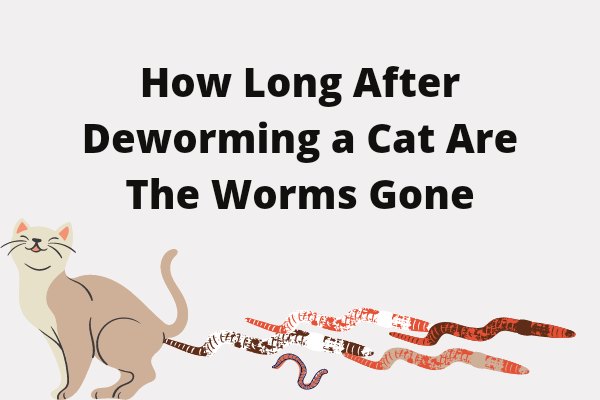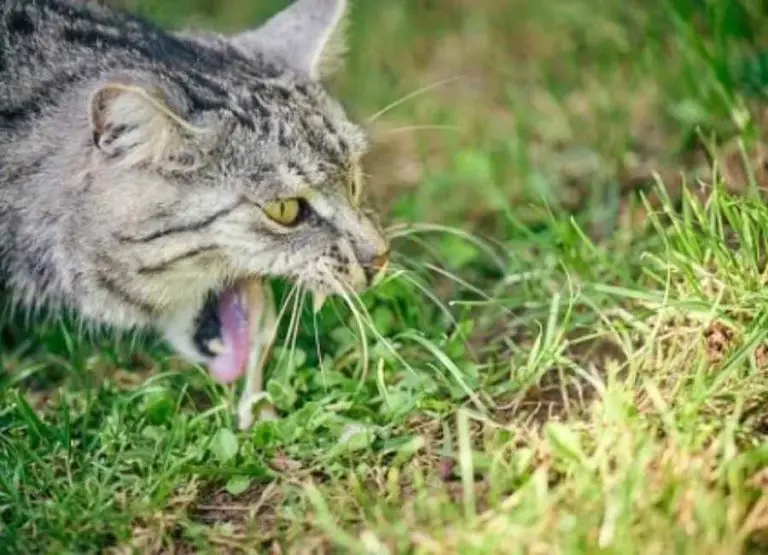How Long After Deworming a Cat Are The Worms Gone? (Answered!!!)

Pet owners deworming their cats always ask how long after deworming a cat are the worms gone, that is what this article is all about.
It is important to keep your cat healthy with regular visits to the vet. Aside from vaccinations, a vet will often recommend a deworming treatment every six months.
But how long does it take for the worms to leave your cat’s body? First, it’s important to know that there are different types of worms cats can get.
One type of worm is roundworm, which can be transmitted from mice and rats in an uncooked food diet.
Tapeworms are also common in cats, and they’re transmitted by fleas.
Finally, a cat can ingest a hookworm if they go outside and then lick themselves after going potty in the dirt.
The worms won’t disappear right away. They can take weeks to disappear if your cat keeps getting reinfected with worms.
De-worming provides protection against roundworms and tapeworms, but how long do you need to wait before your cat will be worm-free again?
Read on for everything you need to know about this important topic.
How Long After Deworming a Cat Are The Worms Gone
After deworming a cat, if the cat is not reinfected with worms by grooming itself or eating infected feces, which means no re-treatment of worms is required, on average it takes about 3 to 9 days for the worms to be completely gone out of the cat intestines or system.
The number of days worms are completely gone from a cat system also depends on some factors as follows:
- The types of individual worms present in the cat system.
- The type of medication or treatment offered to the cat.
- The number of individual worms present in the cat’s intestines.
- Post-deworming rebound effect.
- How resistant the worm is to the particular drug been used.
- The hygienic practices in the cat environment and so on!
After a cat has been dewormed, it can be a little scary to see a new worm in the litter box. This is normal and means that the deworming medication is working.
It will take some time for the worms to die off, but you should notice less worm activity as time goes on.
In order to know how long it will be before your cat is completely worm-free, you need to know how many worms there were in the first place.
The more worms there were, the longer it will take for them all to die off.
Read more: 10 Most Common Cat Dewormer Side Effects You Should Know.
How worming medication works in a cat system
Adult worms may be killed by most worm medicines or drugs within 24 hours after taking them.
In some rare situations, a second dosage administered 20 to 29 days later is required to kill the remaining larvae at the time of therapy.
Worm medicines or drugs work as an antiparasitic agents, killing any worm eggs or larvae in the body and sending them out with the feces.
Unlike immunization, however, wormers are only effective in eliminating live worms and do not prevent worm re-infection. Deworming should be done on a regular basis.
In general, a cat’s chances of contracting worms again after getting a deworming dose are high.
Types of worms found in cats
There are three common types of cats found in cats:
- Tapeworms
- Roundworms
- Hookworms.
Roundworms are common in cats
Roundworms are very common in cats. Kittens can contract the roundworm while still in their mother’s womb or by consuming breast milk.
Roundworm eggs can be found in the soil, on plants, in the feces of infected animals, and on dead animal corpses.
They’re white, smooth, and round. They’ve been compared to living noodles by some, they can infect a cat.
Tapeworms are common in cats
Infected fleas can carry tapeworms and transfer them to cats. Your cat may unintentionally eat a flea by chewing on an inflamed area.
If the flea eggs are eaten, they will hatch. The worm will subsequently latch onto the intestines and grow to be up to 8 inches long.
Tapeworms are unique in that they develop in segments. These fragments may get free and wind up in your cat’s excrement.
They’re flat and rectangular. Eggs can build up on your cat’s anus, causing it to slide around on the floor.
Hookworms are common in cats
Hookworms can be handed on to your kitten from their mother or through the consumption of infected excrement.
These worms are properly named because of their teeth. They cling to the inside of your cat’s stomach.
This might cause bleeding and anemia.
Your cat may become weak and pale if not treated immediately. Hookworms have the ability to kill you, not only your cat if left untreated.
Find out the 9 common ways cats can get worms from dogs.
How to tell your cat still has worms after deworming
Here are some common signs your cat still has worms even after deworming the cat:
- Unexpected noticeable weight loss just days after deworming.
- Unnecessary excessive coughing a few days after deworming.
- Continues dull coat even after deworming medication is completed.
- Continues difficulty in breathing shortly after deworming.
- Distended abdomen shows up again shortly after deworming.
- Continues diarrhea shortly after deworming.
- Poor appetite, even on days when the worm medications are over.
- Sudden collapse shortly after deworming days is over.
- Continues vomiting after deworming.
- Unexpected dehydration a few days after deworming.
- Lethargy continues even days after deworming.
You need to visit the vet when you see a combination of the above-listed signs.
How to stop a cat from getting reinfected with worms after deworming
Here are some tips on how to prevent worm reinfection after deworming your cat:
- Do not purchase low-cost over-the-counter medications.
- Make your cat litter boxes cleaner than ever before during deworming.
- If you see any indications of worm re-infection, take your cat to the doctor.
- When administering your cat worm medication, always follow the veterinarian’s instructions.
- Keep other pets away from your cat while it is being dewormed and afterward.
- Before deworming, make sure you have an effective flea control spray or system in place.
- Clean up your cat’s feces and sanitize the poop site on a regular basis.
- During deworming, avoid over-grooming your cat.
- Keep an eye on your cat’s weight and feces at all times.
Find out more about how to prevent worm infestation in cats.
How do cats get worm-infestation
Here are the common ways cats can get worms:
- Cats get worms from chasing an infected rodent.
- Cats get worms from ingesting fleas.
- Cats get worms from eating a worm-infected mouse
- Cats can get worms from a mosquito bite.
- Cats get worms from unkept litter boxes
- Cats get worms from eating worm larvae.
- Cats get worms from potted plants around your home.
- Cats can get worms from other cats or dogs.
- Cats get worms from unkept human footwear.
To find details of how cats get worms, you can visit this detailed article on how indoor cats get worms.
Diagnosis of worm infestation in cats
Your veterinarian will do a comprehensive examination of your cat and obtain a full medical history from you.
Worm infestation will not be seen in the majority of healthy animals.
Roundworms may be seen in kittens who have a high worm load.
In severe cases, they may acquire a pot belly due to a huge quantity of worms.
Microscopic stool inspection is the most frequent technique to identify worms, however, a single fecal test might be misleading since eggs are not always discharged into the feces.
Broad-spectrum dewormers are commonly used in cases when intestinal worms are highly suspected, and it is also acceptable to deworm cats who go outside and hunt on a regular basis.
Find out if humans can get worms from cats.
Do cats poop out worms after being dewormed?
Yes, cats poop out worms after being dewormed because the dead worms in the cat’s intestines or systems are passed into the stool after administration of the deworming medication.
Do cats feel ill after deworming?
Yes, cats can feel ill after deworming due to the severity of the worm attack, although some cats may have a minor response to a deworming drug, such as vomiting or diarrhea, however, this is uncommon.
To minimize gastrointestinal discomfort, it is occasionally suggested to give the cat oral deworming medicines with meals.
Find out more about how cats get ear mites.
Can I deworm my cat myself?
Yes, you can deworm your cat yourself with a drug prescription from a professional vet, under a strictly followed routine laid by your vet who has diagnosed the type of worm your cat has.
With diagnosing the specific or particular type of worm your cat has, it is not ideal or recommended you deworm your cat yourself.
Find out more about common ways cats get fleas.
Wrapping up
The worms will usually be gone in 3 to 9 days after you give your cat a dewormer.
It may require a second deworming a few weeks later to get rid of all the worms.
Cats are noted for their impeccable hygiene.
They can re-infect themselves with parasites as a result of this.
When your cat has parasite eggs in its bums, they may lick it.
This leads them to re-infect themselves, necessitating the application of a new dewormer.
I hope your question about how long after deworming a cat are the worms gone has been answered!!!




![Cat Lethargic Not Eating or Drinking [Reasons] Cat Lethargic Not Eating or Drinking](https://petcreeks.com/wp-content/uploads/2023/02/Cat-Lethargic-Not-Eating-or-Drinking-768x555.jpg)

